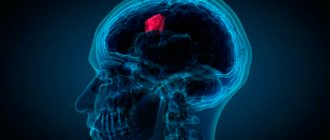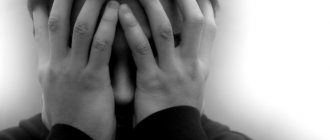Schizophrenia is a mental illness that occurs with rapidly or slowly developing personality changes of a special type (reduction of energy potential, the presence of autistic tendencies, decreased affect, loss of unity of mental processes).
Consequences of schizophrenic psychosis
The development of such a personal deficit is due to the presence of various so-called productive symptoms and syndromes, which, in turn, determine schizophrenic psychosis: affective, delusional, hallucinatory (mainly pseudohallucinatory), hebephrenic, catatonic, as well as oneroid clouding of consciousness. Based on the greater severity of a particular syndrome, the type of schizophrenia is determined. Although the productive symptoms of the disease are specific not only to diseases of the schizophrenia spectrum, their combination with a specific personality defect leads to the formation of syndromes characteristic of this disease with natural dynamics.
The development of the disease, especially during psychotic attacks, leads to distortion or loss of social connections, decreased mental activity, and severe behavioral disturbances, especially with exacerbation of delusions, hallucinations and other productive disorders.
How to get to a psychiatric clinic during an exacerbation of the disease
At the first signs of deterioration or the appearance of characteristic complaints, you should immediately contact a specialist. This is usually done by relatives of patients. You should call our medical center. It is listed on the main page of the site, as well as in other subsections.
Describe the essence of the problem to the registrar. If the situation is urgent, the patient will need to be taken to the hospital. You can do this either on your own or with our help. We have the ability to organize transportation of a person in need from their place of residence to the hospital. There will definitely be a medical professional with him.
If the doctor does not identify any contraindications for hospitalization during the initial examination, then the sick person will be immediately admitted to the inpatient department. The cost of staying in a clinical setting will be reported by the call center receptionist. The price depends on many factors.
Can acute psychosis turn into schizophrenia?
Schizophrenic psychosis is an acute mental disorder that combines symptoms of schizophrenia and psychosis. In the clinical picture of this condition, affective behavior and manic psychopathy are closely intertwined with the characteristic schizoid symptoms characteristic of this disease.
How to distinguish schizophrenia from similar mental pathologies? A feature of schizophrenic thinking disorder is the fact that it occurs against the background of maintaining a person’s intellectual abilities. This destruction of worldview can develop either slowly or quickly, usually accompanied by an increasing loss of energy, symptoms of autism.
The term “schizophrenia” comes from the ancient Greek words with the roots “schizo” (trans. - “to split, split”) and “phren” (“soul, thought, mind, thinking”). Thus, the name of the disease can be roughly translated as “split, split consciousness, thinking.”
Schizophrenia is classified as a group of endogenous mental diseases, the causes of which lie within the human body and are not associated with any external influences on it.
The nature of schizoid disorders makes them fundamentally different from other mental illnesses. A schizophrenic will not become mentally retarded. His level of intelligence will remain the same, although irreversible changes of a pathological nature in the psyche, of course, occur. Sometimes the triggering factor for the development of “special” thinking and worldview in a schizophrenic, as in a number of other psychopathies, will also be stress, heredity, and somatic illnesses.
There is an opinion that the causes of schizoid personality disorder and genius are essentially the same. There are a large number of very gifted and talented people with characteristic symptoms of a schizophrenic nature (even if they did not receive an established diagnosis during their lifetime).
The works of M. Bulgakov, F. Kafka, Guy de Maupassant, F. Dostoevsky, N. Gogol are still read by millions of people around the world today. Canvases by the brilliant artists Vincent Van Gogh and M. Vrubel cost a lot of money. The philosophical works of Nietzsche and Jean-Jacques Rousseau had a significant influence on the development of thought of humanity as a whole. But all these people, one way or another, showed signs of mental disorders. The famous scientists A. Einstein and I. Newton also had a schizoid personality type.
It is obvious that with this pathology both the memory and intelligence of the individual are preserved. The individual continues to hear, see, smell and touch normally, and the brain perceives all incoming information about the world. But processing all this data fails. As a result, the picture of the world compiled in the mind of the patient is radically different from the perception of ordinary healthy people.
Schizophrenic psychosis is an acute stage of manifestation of schizophrenia. Quite often, gradual changes in a person’s psyche are practically invisible to others until these disorders acquire the character of psychosis. The clinical picture of this phase is quite vivid, and often its symptoms become the reason for a diagnosis of schizophrenia.
At the initial stage of development of the disease, a person gradually becomes more and more absent-minded, often stops performing ordinary household rituals, because he does not see the point in them. For example, he stops washing his hair or brushing his teeth - all this will inevitably get dirty again. His speech becomes monosyllabic and slow. Emotions and feelings seem to fade away, the patient almost does not look people in the eyes, his face does not express anything, he loses the ability to enjoy life.
Further, more and more vivid and characteristic signs of pathology increase:
- Symptoms of autism. The mentally ill person is completely immersed in his inner world, not reacting to the life around him, ceasing to interact with others. The difference between his usual activity and the ensuing indifference becomes obvious.
- Inappropriate reactions of an affective nature. It is common for a normal person to laugh and rejoice during cheerful and happy events, and to be sad during grief and failure. A schizophrenic may well react with laughter to threatening events, sincerely rejoice at the sight of death, etc.
- Destroyed associative logic (alogy). Usually it is expressed in the fact that a person loses logical thinking. It is in this regard that the answers of patients with schizophrenia in dialogue are usually monosyllabic - they do not think about the subject of the conversation, without logically developing it in their thoughts, as an ordinary healthy person does.
- Simultaneous experience of opposing feelings and emotions. Literally, such people can love and hate at the same time - those around them, events, phenomena. The patient's will may be paralyzed, since he is unable to make a specific decision, endlessly oscillating between essentially opposite possibilities.
Reasons for development
It has not yet been fully clarified what disorders in the body lead to the onset of a psychotic state in schizophrenia. Medical theorists still have an acute question about what is the triggering factor for an attack. Existing hypotheses do not fully explain all developing deviations. At the moment, only conditions predisposing to psychosis are identified.
These include:
- Hereditary predisposition.
- Disturbances received in the prenatal period of development, infections suffered during pregnancy, leading to damage to the nervous system.
- Regular use and abuse of psychoactive substances. Synthetic salts and spices cause particular concern. It is against this background that doctors most often encounter the debut manifestations of schizophrenic disorders.
- Impact of pronounced stress factors on the psyche.
- Social reasons. Living in dysfunctional families, moral and mental trauma, character traits, tendency to loneliness, apathy, depression.
Work continues to find the underlying causes of schizophrenia. For now, doctors are focusing on the available data.
How is bipolar disorder different from schizophrenia?
Some mental disorders, at first glance, are similar and have similar symptoms. These include bipolar disorder and schizophrenia. They are united by the presence of a common, similar symptom – psychosis. But despite this, they have a number of differences that you should be aware of.
General concept of mental disorders
Any mental disorder always causes certain prejudices or fear.
Most people are confident that such a problem will never affect them, and those who have encountered it are afraid to talk about it for fear of public condemnation.
But the human psyche is a rather mysterious and incomprehensible thing, so many still do not fully understand that it can and should be treated like any other organ.
It seems to us that a mental disorder cannot be ignored, and we often associate it with the inappropriate or strange behavior of someone from our environment. In fact, all sorts of situations happen in life, and we experience them differently, experiencing different emotions:
The reaction to the same situation can be radically different. It all depends on the temperament and psychological background of the person. Norm is a relative concept.
If constant excitement, activity and energy are a common state, then lethargy and lack of initiative can be perceived as pathology, and vice versa.
A person’s mental state is considered normal when he experiences a feeling of peace and joy and at the same time shows his maximum performance and efficiency.
Modern psychiatry is aimed at combating two main diseases. These are schizophrenia and bipolar personality disorder. A state of psychosis is characteristic of both of them. Real events are perceived inadequately, there are hallucinations, delusions, various manias and the most incredible phobias.
It is not possible for a person not related to psychiatry to determine the presence of a particular disorder by eye. Even knowing the main symptoms and manifestations of the disease, without appropriate diagnosis, which takes quite a long period, one cannot say anything.
Bipolar disorder
Bipolar affective disorder is the same manic-depressive psychosis, renamed to a more acceptable and tolerant version. A mental disorder of this type is characterized by periodic changes in states and a radically opposite transformation of mood.
Each phase has its own manifestations. At some point, it seems to a person that the whole world revolves around him, he is the most successful, the smartest, and he has no equal in beauty.
Many ideas come to him, and he is ready to immediately implement them. He barely needs sleep and eats almost nothing.
The speech is very fast, but it is quite difficult to grasp the essence of the statements, since thoughts randomly jump from one topic to another.
These are typical signs of a manic episode. It is replaced by a depressive phase. Its main characteristics are usually directly opposite to the previous one:
- loss of vitality;
- loss of motivation, apathy;
- pessimism;
- low self-esteem;
- tendency to self-harm or suicide.
The frequency of state changes is a purely individual phenomenon. The phases may alternate several times during the day, or each of them may last up to several months or even years. Between periods of bipolar disorder, a state of remission sometimes occurs. It can also continue for quite a long time without any manifestations of psychosis.
Schizophrenia
This is a severe mental disorder, often leading to asocialization or disability. The main symptoms of schizophrenia are visual and auditory hallucinations and delusions. The disease has a negative impact on:
- thinking;
- display of emotions;
- perception of the surrounding world;
- self-esteem;
- general behavior.
While delusions and hallucinations become almost constant companions of a schizophrenic, some qualities are gradually lost. First of all, concentration and self-control suffer.
Such simple and accessible actions as daily hygiene procedures or going to the store are difficult for a person suffering from schizophrenia.
As the disorder progresses, some skills may even atrophy.
Often there is a division of personality. A person, being in one of the separated personalities, has absolutely no memory of what he does while being in the other. It looks scary.
Differences between diseases
In reality, schizophrenia and bipolar disorder are not very different. Since these personality disorders are characterized by a psychotic state, it is with this that the struggle continues throughout the entire period of the illness. The differences lie in the way they influence the causes of unusual behavior.
Both bipolar affective disorder and schizophrenia are chronic diseases, but the differences are obvious to an experienced psychiatrist. The psychosis that occurs with bipolar disorder leads to extreme overstimulation of the nervous system. How is it different from schizophrenia? Next:
- Activity. The state of manic psychosis forces a person to be on the verge of the feelings he is experiencing; his emotions simply overwhelm him. It may be excessive joy or delight. During the period of mania, he can be violent and obsessive, but aggression manifests itself only in rare cases.
- Contact. A person does not withdraw into himself, he remains open to communication, and even strives for this himself.
- The personality remains indivisible. The main thing that fundamentally distinguishes bipolar affective disorder from schizophrenia is the impact on a person’s personal integrity. BAR does not destroy it. Between the phases of depression and mania, the patient remains in a normal state. No matter how long the period of psychosis lasts, personal qualities remain unchanged.
Schizophrenic psychosis has a completely different focus. A person concentrates on his thoughts and experiences, withdraws into himself and degrades.
Treatment prognosis
Chronic diseases, which include bipolar disorder and schizophrenia, are known to be impossible to cure. However, modern methods of early diagnosis and treatment make it possible in most cases to keep these mental disorders under control. With the help of properly selected medications, you can relieve symptoms for a long time and lead a normal lifestyle.
If for schizophrenia drugs of the same spectrum of effects are used, then bipolar disorder requires a more careful approach. The medicine must correspond to the current phase of the disease, otherwise the result will be the opposite of what was expected.
You should know that schizophrenia is a more severe illness than bipolar disorder. It destroys not only the activity of the brain, but also the structure of the patient’s personality. A person loses his passion for life and becomes uninteresting to others. Instincts, including self-preservation, become dulled, which often ends in suicide.
Source: https://arbat25.ru/myi-lechim/psixicheskie-rasstrojstva/chem-bipolyarnoe-rasstrojstvo-otlichaetsya-ot-shizofrenii
Diagnostics
In our medical center, special attention is paid to client examination. Establishing an accurate diagnosis in psychiatry is important not only for the preparation of correct therapy, but also for social aspects. A number of diseases may pose a professional limitation, so no mistakes are allowed during diagnostic procedures.
The diagnosis includes:
Collection of complete anamnestic data. The onset of painful manifestations, their dynamics, and the presence of light gaps must be taken into account. Doctors obtain this information from the words of patients or relatives, as well as from available medical documents and studies.
- Client inspection. The psychiatrist assesses the status of the functions of internal organs and the nervous system. Particular attention is paid to examining the psyche for the presence of disturbances of consciousness, delusional statements, illusory and hallucinatory visions.
- Research of laboratory tests. Patients must have their blood and urine collected to obtain general clinical and biochemical parameters.
- Taking an electrocardiogram.
The diagnostic process continues throughout the entire period of patients’ stay in the clinic. If necessary, adjustments and additions are subsequently made to the main diagnosis.
Great Encyclopedia of Psychiatry - schizophrenic defect
– irreversible residual changes in the mental sphere, personality and behavior that arise as a result of schizophrenia.
The degree and quality of the defect can be established with sufficient reliability only after the final completion of the disease process. Some, largely preliminary, information about the extent of the schizophrenic defect can be obtained in states of remission. Reliable judgments about the severity and structure of the defect in the active period of the disease are impossible, since procedural deficit symptoms are outwardly no different from the symptoms of the defect. The main symptoms of mental deficiency in schizophrenia are most often considered: 1. autism (both deficit and productive), 2. an increasing decrease in activity (passivity, hypobulia, reduction in energy potential, dynamic devastation), 3. progressive emotional impoverishment, 4. steady regression of the personality, its infantilization, alienation of its former life (at the end of the disease there is a significant improvement in well-being and behavior “secondary breakdown” of the personality , however, a return to the previous, pre-painful level of its functioning usually does not occur). 4. thinking disorders (fragmentation, lack of focus, diversity, symbolism); 5. intellectual disorders (decreased creative potential, inability to integrate heterogeneous impressions of what is happening into a holistic view of the situation, decreased critical attitude to ongoing mental changes, decreased ability to plan and forecast). In addition, the structure of the schizophrenic defect includes impoverished speech, poor nonverbal communication, and insufficient self-care skills and social productivity. One should not expect that in schizophrenia there are no symptoms of organic brain damage at all - this hypothesis is purely speculative, based on the idea of the existence of functional mental disorders.
In a state of deep defect, patients exhibit a complete lack of critical attitude towards the manifestations and consequences of the disease. The degree of the defect can vary from its relatively shallow forms to a severe, deeply disabling condition. The clinical structure of the defect is heterogeneous and is determined by differences in the configuration of its symptoms.
There are a number of variants of the schizophrenic defect: a) asthenic variant - relatively mild and the most common. Isolating this type of schizophrenic defect clearly contradicts the deeply rooted idea of schizophrenia as a disease with a fatal outcome in dementia; b) paranoid variant - such patients are especially characterized by secrecy, suspicion and aggressiveness; c) psychopathic variant - such patients are primarily characterized by egocentrism, dictatorial tendencies, and cruelty; d) apatho-abulic variant in this case lethargy, lack of interests and motivations, apathy predominate, but there may be stubbornness and self-will; e) psychoorganic variant - a decrease in memory, mental abilities, intelligence, devastation of the emotional-volitional sphere predominates, as if the fact of the absence of signs of an organic disorder of the brain in schizophrenia had been proven.
Symptoms of a mental defect under certain circumstances can be compensated to one degree or another. Much probably depends on the premorbid makeup and resources of the individual. I. Newton and F. Nietzsche were schizophrenics, as reported in some sources, but their illness apparently proceeded differently and their mental defect clearly did not fit into the Procrustean bed of the mentioned classifications. Stabilization of a mental defect, if this can be accurately determined, indicates the end of the process stage of the disease and the formation of the initial state. In the post-processual stage of schizophrenia, patterns of pathological personality development, reactive states, symptomatic psychoses, and psychopathic behavior caused by situations of frustration are sometimes observed. Synonym: Residual residual states (Mayer-Gross, 1955), Residual schizophrenia.
How does schizophrenic type psychosis manifest?
Clients most often come to our medical center in the acute phase of schizoid psychosis. Attacks can be short-term in nature in the form of isolated excesses. Often there are series of exacerbations with light intervals between them. This course is characterized by a gradual deterioration of each subsequent episode. Remissions, on the contrary, are decreasing.
Psychotic symptoms include:
- Isolated or combined hallucinations of visual, auditory, olfactory composition. One of them may dominate the others.
- Varied in content, pronounced delirium.
- Depression with manifestations of detachment from life.
- Emotional affects.
- Pursuit ideas.
- Depersonalization with complete loss of self-identification and identification with animals and even inanimate objects.
- Motor hyperactivity, or stuporous state.
- Lack of possibility of normal thinking, staying in a pseudo-real world.
- Complete immersion into oneself, into the world of one’s own illusions and hallucinations.
Symptoms of psychosis vary widely. They can build up for several days, then plateau and gradually subside. Treatment significantly softens the clinical picture and its intensity. It is very important to start therapy in a timely manner, select the correct dosage of medication, and eliminate factors that provoke and irritate the patient.
Causes of schizophrenic psychosis
The causes of the acute manifestation of the disease - schizophrenic psychosis, as well as other variants of the course of this disease have not been sufficiently studied.
Hypothesis of the occurrence of schizophrenic psychosis
The main hypothesis for the occurrence of the disease and the manifestation of an acute schizophrenic state is the idea of a disruption of the metabolic processes of the brain, a disruption of the exchange of specific neurotransmitters, which in turn are transmitters of information from one nerve cell to another.
Schizophrenic psychoses are primarily determined by such a disorder of thinking as delusions, disturbances of perception such as visual (images popping up in the head), auditory (voices inside the head) pseudohallucinations, which completely take over a person’s consciousness and subjugate all his mental activity, also at the moment of psychosis in The patient has no criticism towards the disease at all.
Treatment
During the interpsychotic period, maintenance pharmacotherapy is carried out by our doctors on an outpatient basis. It is important that patients are promptly shown to a psychiatrist to monitor their condition and correct the medications used. If psychosis of the schizophrenic type develops, hospitalization will be required.
Our clinic uses the following stages of therapy:
- Mitigation of acute psychotic symptoms. To reduce the manifestations of delusions, hallucinations, affectivity,
neuroleptics. Mental health center specialists use medications and doses that have minimal side effects. Medicines are taken until symptoms are completely reduced. Then a maintenance dosage is prescribed.
- When the psychostatus is stabilized, behavior correctors, sedatives, sleep and mood normalizers, and general strengthening agents are added to pharmacotherapy.
- Psychotherapy. Psychotherapists constantly work with each patient, selecting the most appropriate methods of psychocorrection.
Before discharge, patients are given relapse-preventing medications. Please note that attempts to cope with this painful status on your own are strictly not recommended. Self-medication can lead to sad and fatal results.
Rehabilitation activities
At our mental health center there is the opportunity to undergo psychophysical rehabilitation. Patients suffering from schizophrenia during periods of remission need psychological support. Our psychologists, using special programs, achieve good results in rehabilitation.
Psychoses of the schizophrenia spectrum are very well corrected by both drug therapy and psychotherapy. Experienced psychotherapists at our Leto clinic help many people return to normal family life, engage in work and other activities.
To avoid the return of painful manifestations, clients should adhere to all medical recommendations. It is important to undergo a consultation examination in a timely manner. Relatives of patients also play an important role. Their correct behavior and compliance with all medical prescriptions in most cases reduces the likelihood of relapse of psychosis to zero.
Contact us for help, call the Leto clinic and receive a free and anonymous consultation. If hospitalization is required, our doctors will do everything necessary to quickly resolve the problem.
Diagnostics and tests
When diagnosing, first of all, anamnesis is collected, and the patient’s relatives or people with whom he lives are interviewed .
At this stage, it is necessary to find out whether there were people in the family with mental disorders and when such symptoms began to appear in the patient.
To assess the general physical and mental state, instrumental diagnostic methods and collection of tests can be used :
- general and biochemical blood test;
- Analysis of urine;
- drug test;
- electrocardiogram;
- computed and magnetic resonance imaging.
From a diagnostic point of view, psychological tests have proven themselves well, the principle of which has not changed for more than a century.
One of these testing methods is the Luscher color test (used during periods of “enlightenment”, when the cognitive abilities of the subject are functioning at least partially). The patient is given a choice of 8 or 73 color cards for the short and long versions of the test, respectively.
The point is that the patient independently, without prompting, outside pressure, and without being guided by fashion trends, chooses cards with the colors that are most pleasant for him. According to statistics, people with schizophrenic dementia, like people with schizophrenia, more often choose yellow colors and their shades.
Another common, but simpler test involves tracking a moving object . An arbitrary object moves in front of the patient’s eyes, and in most cases, people with mental disorders of a schizophrenic nature cannot concentrate their gaze on such an object.
As a rule, a person’s gaze begins to lag behind at a certain moment, and after a few seconds the patient “catches up” with the object with his gaze .










